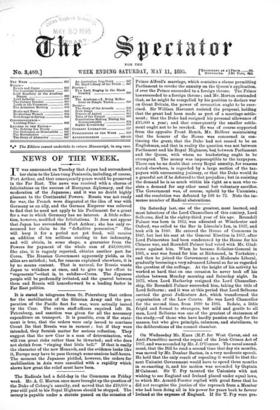The Radicals had a field-day in the Commons on Friday
week. Mr. A. C. Morton once more brought up the question of the Duke of Coburg's annuity, and moved that the £10,000 a year still paid to his Royal Highness should be stopped. The money is payable under a statute passed on the occasion of
Prince Alfred's marriage, which contains a clause permitting Parliament to revoke the annuity on the Queen's application, if ever the Prince succeeded to a foreign throne. The Prince has succeeded to a foreign throne ; and Mr. Morton contended that, as he might be compelled by his position to declare war on Great Britain, the power of revocation ought to be exer- cised. Sir William Harcourt resisted the proposal, holding that the grant had been made as part of a marriage settle- ment; that the Duke had resigned his personal allowance of E15,000 a year; and that consequently the smaller settle- ment ought not to be revoked. He was of course supported from the opposite Front Bench, Mr. Balfour maintaining that the honour of the House was concerned in con- tinuing the grant, that the Duke had not ceased to be an Englishman, and that in reality the question was not between Parliament and his Royal Highness, but between Parliament and the Queen, with whom no huckstering ought to be attempted. The money was imperceptible to the tax-payers. There can be no doubt that every Royal annuity, for reasons stated elsewhere, is regarded by a large section of the tax- payers with unreasoning jealousy, or that the Duke would do a graceful act if he deferred to that prejudice; but in resisting the demand he is as much within his right as a man who re- sists a demand for any other usual but voluntary sacrifice. The Government was, of course, upheld by the Unionists ; and the resolution was defeated by 198 to 72. Note the im- mense number of Radical abstentions.






































